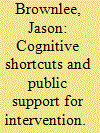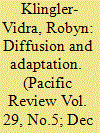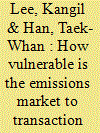|
|
|
Sort Order |
|
|
|
Items / Page
|
|
|
|
|
|
|
| Srl | Item |
| 1 |
ID:
173771


|
|
|
|
|
| Summary/Abstract |
Scholars of public opinion on military intervention agree that survey respondents make judgments from limited information. Yet researchers still question whether ordinary Americans reflect elite attitudes or instead reach their own “pretty prudent” conclusions from the stated principal policy objective (PPO). This article adjudicates the debate while incorporating lessons from the study of bounded rationality. Evidence comes from an original data set of aggregate US public opinion, covering 1,080 nationally representative survey items about launching operations, across thirty-five countries, during 1981 to 2016. Tests show that PPO matters: pursuing “internal policy change” is less popular than restraining international aggression. However, language reflecting White House cues and one prominent cognitive shortcut (the “availability heuristic”) statistically and substantively outperforms PPO at predicting intervention support. The results indicate that when ordinary Americans are polled about using force against salient foes (Saddam Hussein, al-Qaeda, Islamic State in Iraq and Syria), elements of bounded rationality can overtake the prudence expressed toward less vivid problems.
|
|
|
|
|
|
|
|
|
|
|
|
|
|
|
|
| 2 |
ID:
148311


|
|
|
|
|
| Summary/Abstract |
Diffusion scholarship expects little adaptation of core elements of policy models. However, the empirical reality is different; diffusion of even highly regarded models, such as the Silicon Valley venture capital (VC) policy model, results in marked adaptation. This article demonstrates why the Silicon Valley VC model is necessarily adapted differently by policy-makers in the geographically, ethnically and economically proximate states of Hong Kong, Taiwan and Singapore. More specifically, these policy-makers' interventionist orientations, private sector financing preferences and international versus domestic firm promotion biases drive contextually rational – and unique – adaptations of the Silicon Valley VC policy model.
|
|
|
|
|
|
|
|
|
|
|
|
|
|
|
|
| 3 |
ID:
192728


|
|
|
|
|
| Summary/Abstract |
This paper theoretically establishes a solar sheep game model under three cases to capture the friction among the stockholders including the government, PV investors, and shepherds. Nash equilibrium has been revealed for analyzing the impact of different policies on the benefits of each player. The results show that the implementation of the feed-in tariff (FIT) policy can maximize the government’s revenue. However, when the government focuses on promoting poverty alleviation for shepherds, the sheep farming (SF) subsidy policy is more efficient than FIT if the positive effect of the PV panel on sheep raising is not enough. Besides, dynamic system models are established either to study the bounded rationality behavior during the decision process in the long run. Thresholds regarding speed of decision adjusting for each player are found. Results also show the system will lose stability if players adjust their decisions too frequently. Based on data from Talatan and Cascadilla, numerical analysis has been applied to illustrate the managerial implications from the proposed model.
|
|
|
|
|
|
|
|
|
|
|
|
|
|
|
|
| 4 |
ID:
150830


|
|
|
|
|
| Summary/Abstract |
The impact of transaction costs on the early emissions trading market is examined by applying an agent-based model and simulation (ABMS) approach. For a realistic model set up, bounded rationality, stochastic characteristics, and learning-by-doing are considered in our search processes. Marginal abatement cost parameters are obtained from Yoo et al. (2010), which is an experimental study on the emissions trading in the Korean power sector. Sensitivity analyses are performed on market performance indices with regard to transaction cost parameters, which represent scales and the learning elasticities of transaction costs. A total of 960 simulations were run in this sensitivity analysis. Sensitivity analysis results consistently show that higher transaction costs worsen market performance. The most remarkable finding in these results is that welfare performance of all the transactions decreases by up to 50% as the scale parameters of transaction costs increase, implying that welfare gain from introducing emissions trading disappears significantly. However, with learning curve effect, welfare performance could be regained by up to 26%. In sum, although transaction costs significantly encroach upon trade gains at the early stage, based on our simulation results, the welfare loss by way of transaction costs is lessened as the knowledge of market participants progresses.
|
|
|
|
|
|
|
|
|
|
|
|
|
|
|
|
| 5 |
ID:
163598


|
|
|
|
|
| Summary/Abstract |
Pyongyang is subject to constraints on rational decision-making, and sometimes just makes mistakes.
|
|
|
|
|
|
|
|
|
|
|
|
|
|
|
|
| 6 |
ID:
083748


|
|
|
|
|
| Publication |
2008.
|
| Summary/Abstract |
The authors investigate the strategic rationale behind the message sent by Osama bin Laden on the eve of the 2004 U.S. Presidential elections. They model this situation as a signaling game in which a population of receivers takes a binary choice, the outcome is decided by majority rule, sender and receivers have conflicting interests, and there is uncertainty about both players' degree of rationality. They characterize the structure of the sequential equilibria of the game as a function of the parameters governing the uncertainty and find that in all pure strategy equilibria, the outcome most preferred by the rational sender is chosen. An explanation of the above-mentioned events relies crucially on the relative likelihood of rational and naive players: If a sufficient departure from full rationality of the electorate is posited, then our model suggests that bin Laden's pre-electoral message succeeded in tilting the race toward his preferred outcome.
|
|
|
|
|
|
|
|
|
|
|
|
|
|
|
|
| 7 |
ID:
165143


|
|
|
|
|
| Summary/Abstract |
Since 2011, Myanmar has undertaken a series of domestic and foreign policy reforms, including democratisation and peacebuilding, before and after the watershed November 2015 elections in the country. These reform processes have called into question whether China, which has been Myanmar's dominant great power neighbour throughout the previous era of military government in the country formerly known as Burma, would find its strategic position eroding as Myanmar further opens to the international community. However, the concept of China ‘losing’ diplomatic ground to other actors, including the West, in Myanmar implies a zero-sum game that does not adequately address Beijing's still-formidable geostrategic presence vis-à-vis its southern neighbour. China has now started to implement a more multi-faceted, ‘resilience network’-building approach to maintaining its special status in Myanmar's foreign policy, a situation which will persist as Myanmar continues its uncertain path towards further reform.
|
|
|
|
|
|
|
|
|
|
|
|
|
|
|
|
|
|
|
|
|